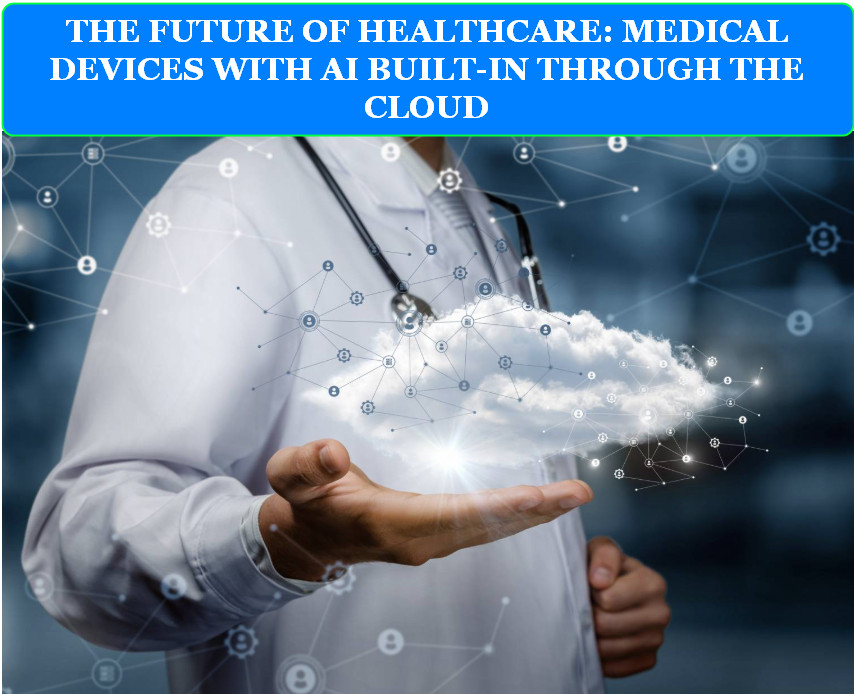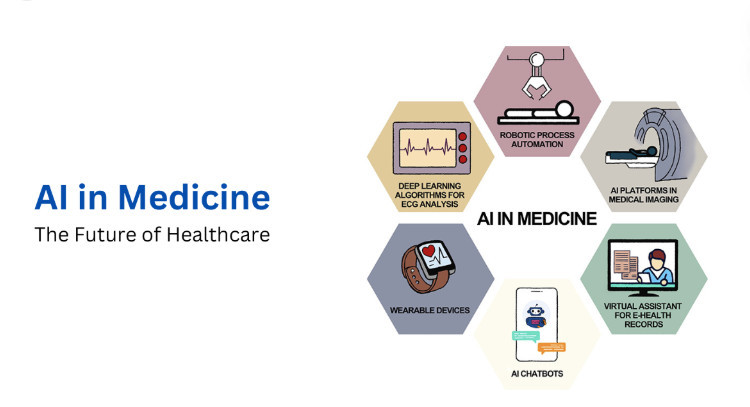THE FUTURE OF HEALTHCARE: MEDICAL DEVICES WITH AI BUILT-IN THROUGH THE CLOUD

INTRODUCTION
The healthcare industry is undergoing a transformative revolution, driven by the convergence of artificial intelligence (AI), cloud computing, and medical devices. This synergy is paving the way for smarter, more efficient, and more personalized healthcare solutions. Medical devices with AI built-in, powered by cloud computing, are at the forefront of this transformation. These devices are not only enhancing the capabilities of healthcare providers but also improving patient outcomes, reducing costs, and enabling more proactive and preventive care.
In this article, we will explore the role of AI in medical devices, the benefits of cloud integration, the challenges and opportunities, and the future prospects of this rapidly evolving field.
THE ROLE OF AI IN MEDICAL DEVICES
Artificial intelligence has become a cornerstone of modern healthcare, and its integration into medical devices is revolutionizing the way we diagnose, treat, and monitor patients. AI-powered medical devices leverage machine learning algorithms, natural language processing, and computer vision to analyze vast amounts of data, identify patterns, and make informed decisions in real-time.
- DIAGNOSTIC ACCURACY: AI algorithms can analyze medical images, such as X-rays, MRIs, and CT scans, with remarkable precision. For example, AI-powered imaging devices can detect early signs of diseases like cancer, cardiovascular conditions, and neurological disorders, often with greater accuracy than human radiologists.
- PERSONALIZED TREATMENT: AI-enabled devices can tailor treatments to individual patients based on their unique genetic makeup, medical history, and lifestyle. For instance, AI-driven insulin pumps can continuously monitor blood glucose levels and adjust insulin delivery in real-time, providing personalized diabetes management.
- PREDICTIVE ANALYTICS: AI can predict potential health issues before they become critical. Wearable devices equipped with AI can monitor vital signs, such as heart rate, blood pressure, and oxygen levels, and alert healthcare providers to any anomalies that may indicate an impending health crisis.
- REMOTE MONITORING: AI-powered medical devices enable remote patient monitoring, allowing healthcare providers to track patients’ health conditions from afar. This is particularly beneficial for patients with chronic conditions, such as heart disease or diabetes, who require continuous monitoring.
THE POWER OF CLOUD INTEGRATION
While AI enhances the capabilities of medical devices, cloud computing amplifies their potential by providing a scalable, secure, and accessible platform for data storage, processing, and analysis. Cloud integration offers several key advantages:
1. DATA STORAGE AND MANAGEMENT: Medical devices generate vast amounts of data, from patient records to real-time monitoring data. The cloud provides a centralized repository for storing and managing this data, ensuring that it is easily accessible to healthcare providers, regardless of their location.
2. REAL-TIME DATA ANALYSIS: CLOUD computing enables real-time data analysis, allowing AI algorithms to process and interpret data as it is collected. This is crucial for applications like remote patient monitoring, where timely insights can make a significant difference in patient outcomes.
3. SCALABILITY: The cloud offers virtually unlimited storage and computational resources, making it possible to scale AI-powered medical devices to accommodate growing data volumes and user bases. This scalability is essential for large-scale healthcare applications, such as population health management.
4. COLLABORATION AND INTEROPERABILITY: Cloud platforms facilitate collaboration among healthcare providers by enabling seamless data sharing and interoperability between different medical devices and systems. This ensures that patient data is consistent and up-to-date across all platforms, improving coordination and continuity of care.
5. COST EFFICIENCY: By leveraging cloud infrastructure, healthcare organizations can reduce the costs associated with maintaining on-premises data centers and IT infrastructure. Cloud-based solutions also offer flexible pricing models, allowing organizations to pay only for the resources they use.
Challenges and Opportunities
While the integration of AI and cloud computing in medical devices holds immense promise, it also presents several challenges that must be addressed to fully realize its potential.
1. DATA PRIVACY AND SECURITY: The sensitive nature of healthcare data makes privacy and security paramount. Ensuring that patient data is protected from unauthorized access, breaches, and cyberattacks is a critical challenge. Robust encryption, access controls, and compliance with regulations like HIPAA and GDPR are essential to safeguarding data.
2. REGULATORY COMPLIANCE: Medical devices are subject to stringent regulatory requirements to ensure their safety and efficacy. The integration of AI and cloud computing adds complexity to the regulatory landscape, as these technologies introduce new risks and uncertainties. Regulatory bodies must adapt to these changes and provide clear guidelines for the development and deployment of AI-powered medical devices.
3. INTEROPERABILITY: The healthcare industry is characterized by a multitude of devices, systems, and standards, often leading to interoperability issues. Ensuring that AI-powered medical devices can seamlessly integrate with existing healthcare infrastructure is crucial for their widespread adoption.
4. ETHICAL CONSIDERATIONS: THE use of AI in healthcare raises ethical questions, such as the potential for bias in AI algorithms, the impact on patient autonomy, and the accountability for AI-driven decisions. Addressing these ethical concerns is essential to building trust in AI-powered medical devices.
5. DATA QUALITY AND STANDARDIZATION: The accuracy and reliability of AI algorithms depend on the quality of the data they are trained on. Ensuring that healthcare data is accurate, complete, and standardized is a significant challenge, particularly given the variability in data collection methods and formats.
Despite these challenges, the opportunities presented by AI-powered medical devices through the cloud are immense. By addressing these challenges, healthcare organizations can unlock the full potential of these technologies to improve patient care, reduce costs, and drive innovation.
FUTURE PROSPECTS
The future of medical devices with AI built-in through the cloud is bright, with several trends and developments poised to shape the landscape in the coming years.
1. EDGE COMPUTING: While cloud computing offers numerous benefits, there is a growing interest in edge computing, where data is processed closer to the source (i.e., the medical device) rather than being sent to the cloud. This approach reduces latency, enhances real-time decision-making, and addresses privacy concerns by keeping sensitive data on-premises.
2. AI-DRIVEN DRUG DISCOVERY: AI-powered medical devices are not limited to diagnostics and treatment. They are also playing a crucial role in drug discovery, where AI algorithms analyze vast datasets to identify potential drug candidates and predict their efficacy. Cloud computing facilitates this process by providing the computational power needed to process complex data.
3. TELEMEDICINE AND VIRTUAL CARE: The COVID-19 pandemic has accelerated the adoption of telemedicine and virtual care, and AI-powered medical devices are at the heart of this shift. Cloud-based platforms enable remote consultations, virtual diagnostics, and continuous monitoring, making healthcare more accessible and convenient for patients.
4. WEARABLE TECHNOLOGY: The proliferation of wearable devices, such as smartwatches and fitness trackers, is driving the demand for AI-powered health monitoring. These devices collect a wealth of data on users’ health and activity levels, which can be analyzed in the cloud to provide personalized insights and recommendations.
5. AI IN SURGERY: AI-powered surgical robots are revolutionizing the field of surgery by enhancing precision, reducing invasiveness, and improving outcomes. Cloud integration allows these robots to access vast datasets and AI models, enabling them to perform complex procedures with greater accuracy.
6. POPULATION HEALTH MANAGEMENT: AI-powered medical devices, combined with cloud computing, are enabling a shift from reactive to proactive healthcare. By analyzing data from large populations, healthcare providers can identify trends, predict outbreaks, and implement preventive measures to improve public health.
CONCLUSION
The integration of AI and cloud computing in medical devices is transforming the healthcare industry, offering unprecedented opportunities to improve patient care, reduce costs, and drive innovation. From diagnostic accuracy and personalized treatment to remote monitoring and predictive analytics, AI-powered medical devices are revolutionizing the way we approach healthcare.
However, realizing the full potential of these technologies requires addressing challenges related to data privacy, regulatory compliance, interoperability, and ethical considerations. By overcoming these hurdles, healthcare organizations can harness the power of AI and cloud computing to create a more efficient, accessible, and patient-centric healthcare system.
As we look to the future, the continued evolution of AI-powered medical devices through the cloud promises to unlock new possibilities in healthcare, from edge computing and AI-driven drug discovery to telemedicine and population health management. The journey has just begun, and the possibilities are limitless. The future of healthcare is here, and it is powered by AI and the cloud.
New chat

